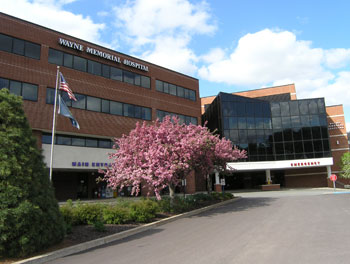 While neighboring Pike County has experienced the largest population growth statewide in recent years, Northeast PA’s Wayne County, while no stranger to change, is still largely the picturesque rural community it has always been.
While neighboring Pike County has experienced the largest population growth statewide in recent years, Northeast PA’s Wayne County, while no stranger to change, is still largely the picturesque rural community it has always been.
Its primary healthcare facility, Wayne Memorial Hospital in Honesdale, however, is quite the opposite. The facility has had to grow and mature along with expanding population and technology, and just received a boost that will enable telemedicine to be more widely integrated into its services.
Wayne Memorial, which serves close to 100,000 in Wayne, Pike and surrounding areas, announced last week it was one of 106 projects (including five in PA) that received a combined $34.7 million in grants to fund educational projects and expand access to health care services in rural areas through the United States Department of Agriculture’s Distance Learning and Telemedicine Program.
Wayne Memorial received the largest chunk among PA recipients–$351,748. The money will enable Wayne Memorial to:
– Offer digital mammography for the first time at its Pike County clinic in Lords Valley.
– Purchase direct capture digital technology to transmit x-rays to off-site physicians and consultants.
– Enhance its fetal monitoring system with mobile capability at its New Beginnings Birthing Suites (opened in 2005 and funded through a USDA telemedicine grant).
– Utilize Telecardiology to instantly transmit echo-cardiograms to cardiologists at remote locations and Telestroke to provide a real-time link between Wayne Memorial and Geisinger Medical Center’s Primary Stroke Center.
“There are more and more specialists today but it’s hard for a rural community to recruit them,” says Wayne Memorial spokesperson Lisa Champeau. “Having telemedicine allows us to transmit readings and images faster, safer and more accurately.”
The direct capture radiology, for instance, allows technicians to capture an x-ray much faster–in five seconds, compared to 90–and much more accurately. This is especially important for trauma or acutely ill patients with limited mobility, while radiation dosage can also be significantly reduced (up to 50 percent in some cases).
Grants also went to Lewistown Hospital ($127,543), Hospital Council of Western Pennsylvania ($104,033), University of Pittsburgh Medical Center ($125,773), and Saint Vincent Health Center Foundation ($157,300).
Joe Petrucci is managing editor of Keystone Edge. Send feedback here.
